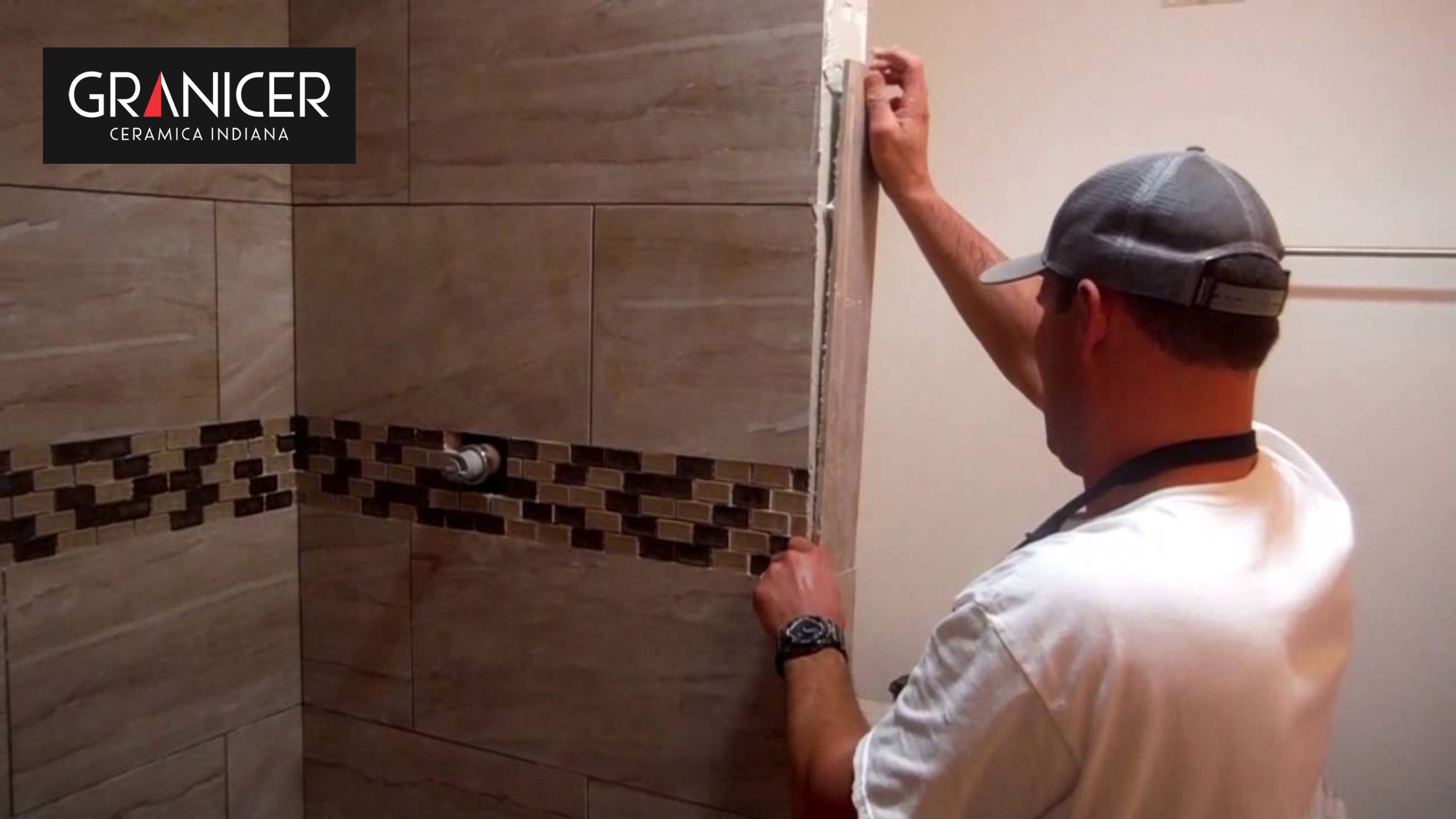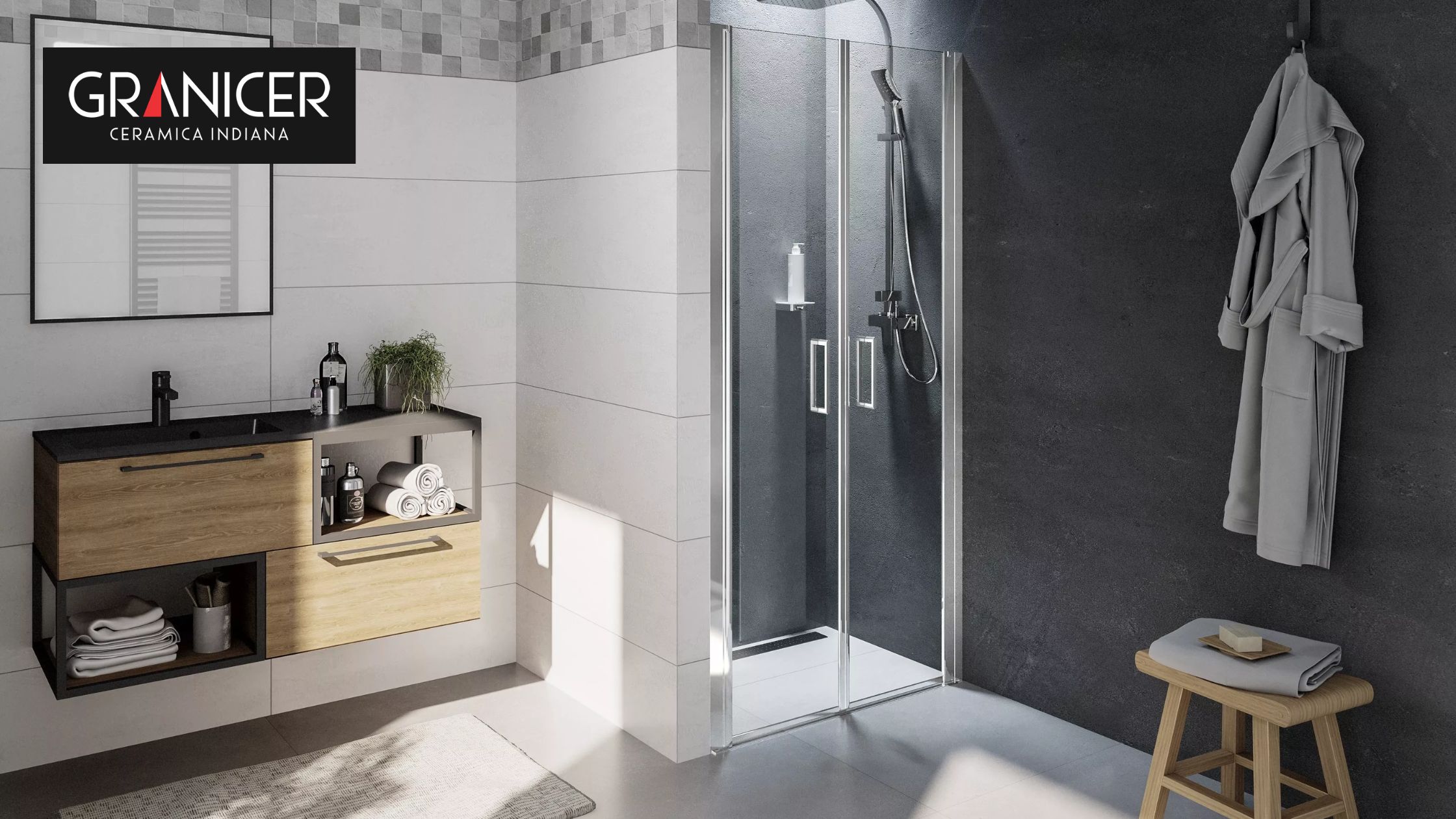
The choice of wall material is paramount when designing a stunning and functional shower space. Porcelain tiles have gained immense popularity for shower walls, and for good reason. This comprehensive guide will explore the suitability of porcelain tiles for shower walls, their benefits, installation and maintenance considerations, and the best finish options.
Whether you're planning a bathroom renovation or simply curious about your options, this guide will provide all the information you need to make an informed decision about using porcelain tiles in your shower.
Benefits of Using Porcelain Tiles For Shower Areas
Water Resistance
Porcelain tiles are renowned for their exceptionally low water absorption rate, typically absorbing less than 0.5% of water. This makes them highly resistant to moisture, a critical feature for wet environments like showers. Their low porosity ensures that water does not penetrate the tile, preventing water damage and reducing the risk of mold and mildew growth.
Durability
Porcelain is a dense, hard material that can withstand daily use and constant exposure to water without deteriorating. Its strength and resilience make it an ideal choice for shower walls, ensuring they remain in excellent condition for years. Unlike some other materials, porcelain is resistant to scratching, chipping, and cracking, making it a long-lasting option for wet areas.
Easy Maintenance
The smooth, non-porous surface of porcelain tiles makes them incredibly easy to clean and maintain. They resist stains, mold, and mildew, which are common concerns in shower environments. Regular cleaning with a mild cleaner is usually sufficient to keep porcelain tiles looking pristine, making them a low-maintenance option for busy households.
Versatility in Design
Porcelain tiles come in a wide array of colors, patterns, and textures, providing ample design flexibility. You can find options that mimic the appearance of natural stone, wood, or even fabric, allowing you to create any look you desire in your shower. This versatility enables homeowners to match their shower design seamlessly with the rest of their bathroom decor.
Cost-Effective
While the initial costs of porcelain tiles may be higher than some alternatives, their longevity and low maintenance requirements make them a cost-effective choice in the long run. Porcelain tiles can outlast many other materials, reducing the need for frequent replacements and repairs. This durability translates into long-term savings on both material and labor costs.
Large Format Options
Porcelain tiles are available in large formats, which means fewer grout lines in your shower. This not only creates a sleek, modern look but also reduces areas where mold and mildew can grow. Fewer grout lines simplify cleaning and maintenance, enhancing the overall hygiene and aesthetic appeal of your shower.
Considerations When Using Porcelain Tiles in Showers
Proper Installation
Proper installation of porcelain tiles in a shower environment is crucial to their performance and longevity. Key steps include:
-
Using a Waterproof Membrane: Install a waterproof membrane behind the tiles to prevent water from seeping into the wall structure.
-
Adhesive and Grout: Employ the right adhesive and grout suitable for wet areas. High-quality materials ensure a strong bond and durability.
-
Water Drainage: Ensure proper slope for water drainage to avoid water pooling and potential damage.
Slip Resistance
For shower floors, it's important to choose porcelain tiles with adequate slip resistance. Look for tiles with a high coefficient of friction or those specifically rated for wet areas. Textured or matte finish tiles can provide additional traction, enhancing safety in the shower.
Grout Selection
Use a high-quality, water-resistant grout to ensure durability and prevent water infiltration. Epoxy grouts are an excellent choice for shower applications as they are highly water-resistant and less prone to staining. Proper grout selection helps maintain the shower's integrity and appearance.
Sealing
While porcelain tiles themselves typically do not need sealing, the grout lines should be sealed to enhance water resistance and make cleaning easier. Regularly sealing the grout helps prevent stains and moisture penetration, prolonging the life of your shower.
Size and Weight
Consider the size and weight of the tiles, especially for large format options. Ensure your shower walls can support the weight of the tiles you choose. Large tiles can create a seamless look but may require additional support or reinforcement during installation.
Installation Tips for Porcelain Tiles on Shower Walls

Prepare the Surface
Ensure the shower walls are clean, dry, and free from any loose material. Install a waterproof membrane or cement board as a substrate to provide a solid, moisture-resistant foundation for the tiles.
Plan the Layout
Dry-lay your tiles to plan the layout and make any necessary cuts before applying adhesive. Planning the layout helps ensure a balanced, aesthetically pleasing design and minimizes the need for awkward cuts.
Use the Right Tools
Invest in quality tile cutters and nippers for clean, precise cuts, especially around fixtures. Using the correct tools ensures a professional finish and reduces the risk of damaging the tiles during installation.
Apply Adhesive Correctly
Use a notched trowel to apply the adhesive evenly. For large format tiles, consider back-buttering to ensure full coverage and a strong bond. Proper adhesive application prevents tiles from shifting or coming loose over time.
Allow Proper Curing Time
Follow manufacturer recommendations for curing times before grouting and using the shower. Allowing sufficient curing time ensures the adhesive sets properly, providing a durable and stable installation.
Maintenance of Porcelain Tile Shower Walls
Regular Cleaning
Wipe down tiles after each use to prevent water spots and soap scum buildup. Regular cleaning helps maintain the appearance and hygiene of the shower, keeping tiles looking fresh and new.
Deep Cleaning
Periodically clean with a pH-neutral cleaner designed for porcelain tiles. Deep cleaning removes any accumulated grime or residue, preserving the tiles' finish and preventing discoloration.
Avoid Harsh Chemicals
Steer clear of abrasive cleaners or acidic solutions that can damage the tiles or grout. Using gentle, tile-specific cleaners helps maintain the integrity and appearance of the shower.
Check Grout Lines
Regularly inspect grout lines for any signs of wear or mold growth. Address issues promptly to maintain the integrity of your shower and prevent further damage. Proper grout maintenance ensures a long-lasting, attractive shower.
Reseal Grout
Reapply grout sealer annually or as recommended by the manufacturer to maintain water resistance. Regular sealing protects grout lines from moisture and stains, enhancing the durability and appearance of your shower.
Best Porcelain Tile Finishes For Shower Wall And Floor

When selecting porcelain tiles for your shower, the finish of the tile plays a crucial role in both aesthetics and functionality. Here are some of the best porcelain tile finishes for shower walls and floors:
Matt Finish
Matt porcelain tiles have a non-reflective surface that provides excellent slip resistance, making them ideal for shower floors. They also hide water spots and fingerprints well, requiring less frequent cleaning. On shower walls, matt tiles create a soft, sophisticated look that works well in both modern and traditional bathrooms. The understated elegance of matt tiles allows other design elements to shine.
Wood-Look Finish
Wood-look porcelain tiles bring the warmth and natural beauty of wood to your shower without the maintenance concerns of real wood. These tiles feature realistic wood grain patterns and textures, available in various "species" and colors. They work exceptionally well on shower walls, creating a spa-like atmosphere. When used on shower floors, ensure they have adequate slip resistance.
Satin Finish
Satin finish porcelain tiles offer a middle ground between matt and glossy finishes. They have a subtle sheen that adds a touch of elegance without being too reflective. This finish is excellent for shower walls as it's easy to clean and provides a soft, luxurious look. On shower floors, satin finish tiles can work well but check their slip resistance rating.
Rotto Finish
Rotto finish, also known as "ripped" finish, provides a unique, textured look to porcelain tiles. This finish mimics the appearance of natural stone with rough, uneven edges. It's particularly suitable for creating a rustic or industrial aesthetic in your shower. The textured surface can provide good slip resistance for shower floors, but be aware that it may require more thorough cleaning to prevent soap scum buildup in the textured areas.
Polished Finish
While not as common for shower floors due to potential slipperiness when wet, polished porcelain tiles can create a stunning look on shower walls. Their high-gloss surface reflects light, making the space appear larger and brighter. If used in a shower, they're best reserved for walls or paired with more slip-resistant options for the floor.
|
Pro Tip: Installing rectangular tiles vertically will create the illusion of height in your shower. |
Uplift Your Shower Walls with Stunning Porcelain Tiles
Porcelain tiles are an excellent choice for shower walls, offering a perfect blend of functionality and style. Their water resistance, durability, and design versatility make them ideal for creating a beautiful, long-lasting shower space.
For the ultimate shower experience, consider Granicer. Our exclusive range of porcelain tiles in various finishes is perfect for elevating your shower space. By choosing Granicer, recognized as the best porcelain tile company, you can ensure a shower that not only looks stunning but also stands the test of time, providing both aesthetic pleasure and practical benefits.